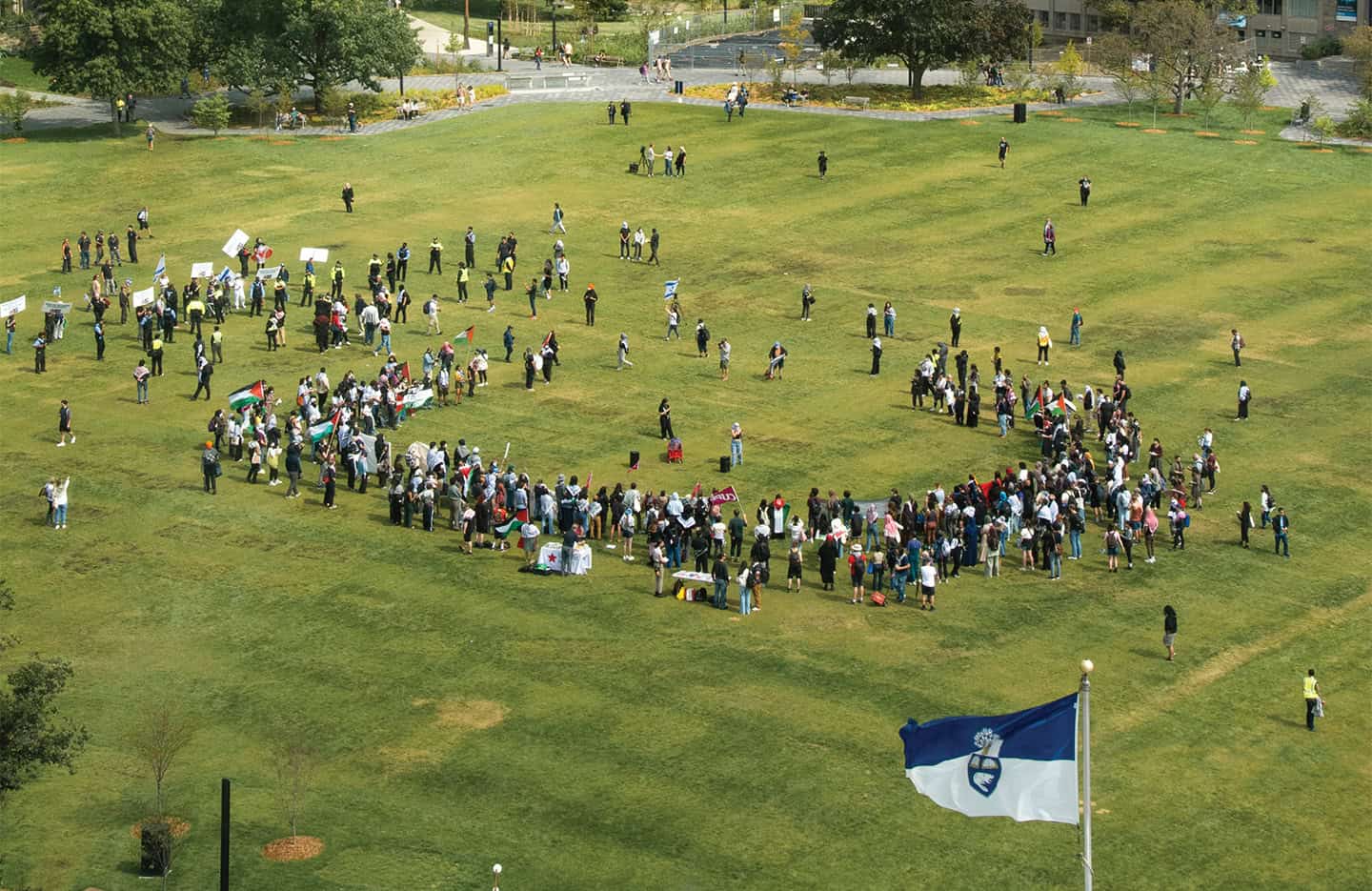On September 6, UofT Occupy for Palestine (O4P) organized a back-to-school rally at King’s College Circle, continuing their demands for U of T to disclose its financial holdings, divest from companies supplying Israel with weapons, and cut ties with Israeli academic institutions.
This follows the 63-day encampment at King’s College Circle, which student protestors cleared after the university granted them an amnesty offer. In August, protesters also staged an occupation of the University of Toronto Asset Management Corporation (UTAM) headquarters, the company responsible for investing in U of T’s endowment portfolio.
Start of year student rally
O4P held the rally at 12:00 pm to continue pressing their demands against the university. Around 100 protesters gathered in a circle on the field in front of Simcoe Hall.
O4P announced the rally in an Instagram post on August 28. “We are showing up to make it known to the University of Toronto administration that our advocacy for Palestine will continue until they cease their financial and ideological support for the criminal state currently committing genocide in Gaza,” it wrote.
In an interview with The Varsity, Erin Mackey, a recent alumna and former O4P spokesperson, discussed the significance of the back-to-school rally.
“I think that students are here continuing to show this administration that we will continue to show up day in and day out to demand divestment [and] ensure that U of T is no longer complicit in the ongoing genocide that’s happening in Palestine,” she said.
As of writing, over 41,000 Palestinians and more than 1,000 Israelis have been killed since October 7. In an International Court of Justice ruling in January, the court found that it is “plausible” that Israel has committed acts against Palestinians that violate the Genocide Convention.
A university spokesperson has stated that any claims connecting the university to Israeli military action have “no basis in fact.”
A group of approximately 20 counter-protesters arrived on the field soon after the rally began, with a line of Campus Safety and security officers positioned between them and the protesters. The protesters continued chants, including “disclose, divest, we will not stop, we will not rest.”
Eight minutes later, a group of around 30 Toronto Metropolitan University (TMU) students joined the circle. The students were met with cheers, and the protesters chanted altogether, “same struggle, same fight, all the students must unite.”
By 12:40 pm, the protesters left King’s College Circle, leaving small Palestinian paper flags across the lawn.
They then made their way to Queen’s Park where they stopped to hold a Jummah prayer — a Friday prayer performed by Muslims — in the middle of College Street, just outside King’s College Road. As the prayer ended, counter-protesters shouted, “free the hostages now.”
As of September 8, the Israeli government has estimated that more than 100 hostages are still being held in Gaza.
The protesters then continued heading down College Street.
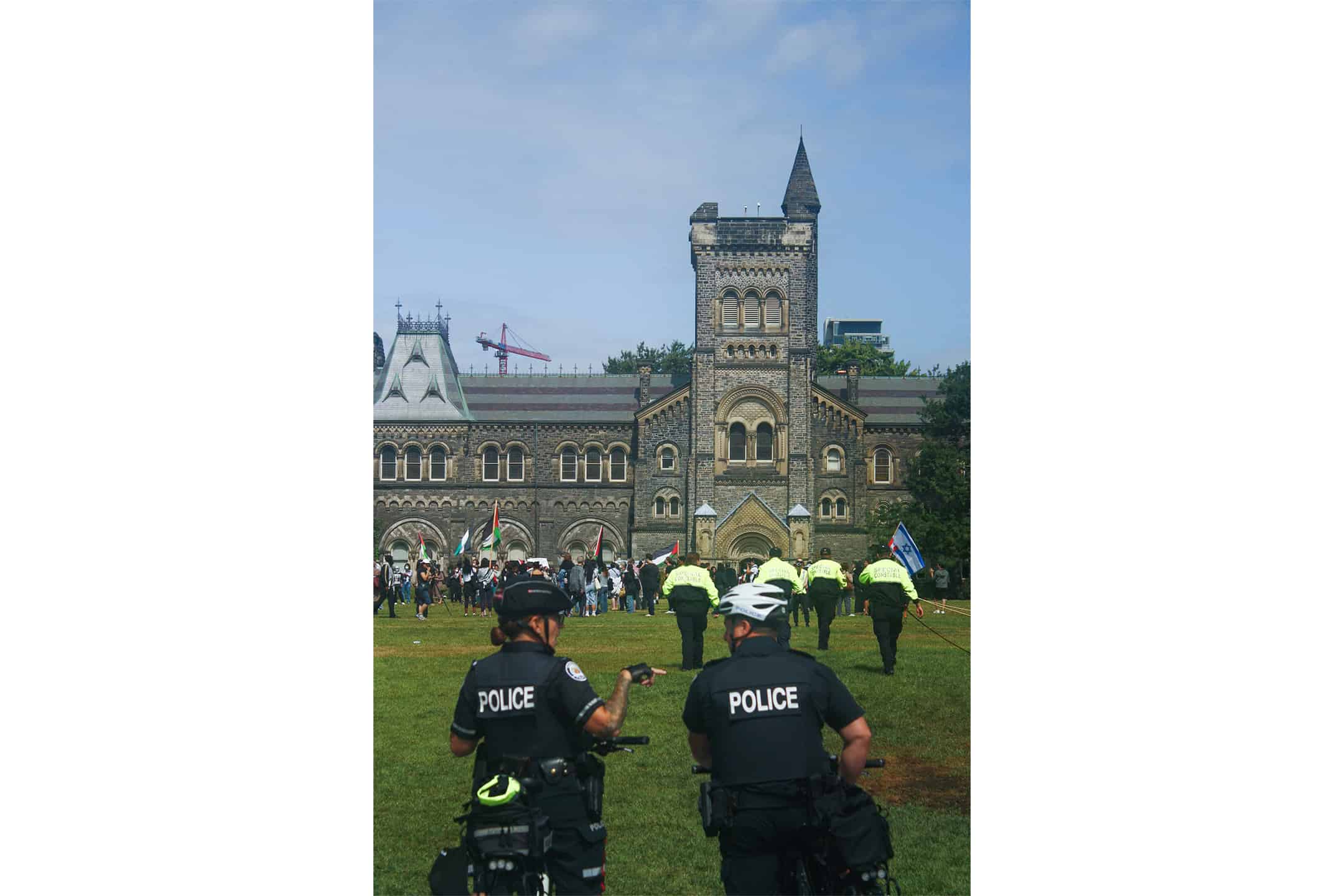
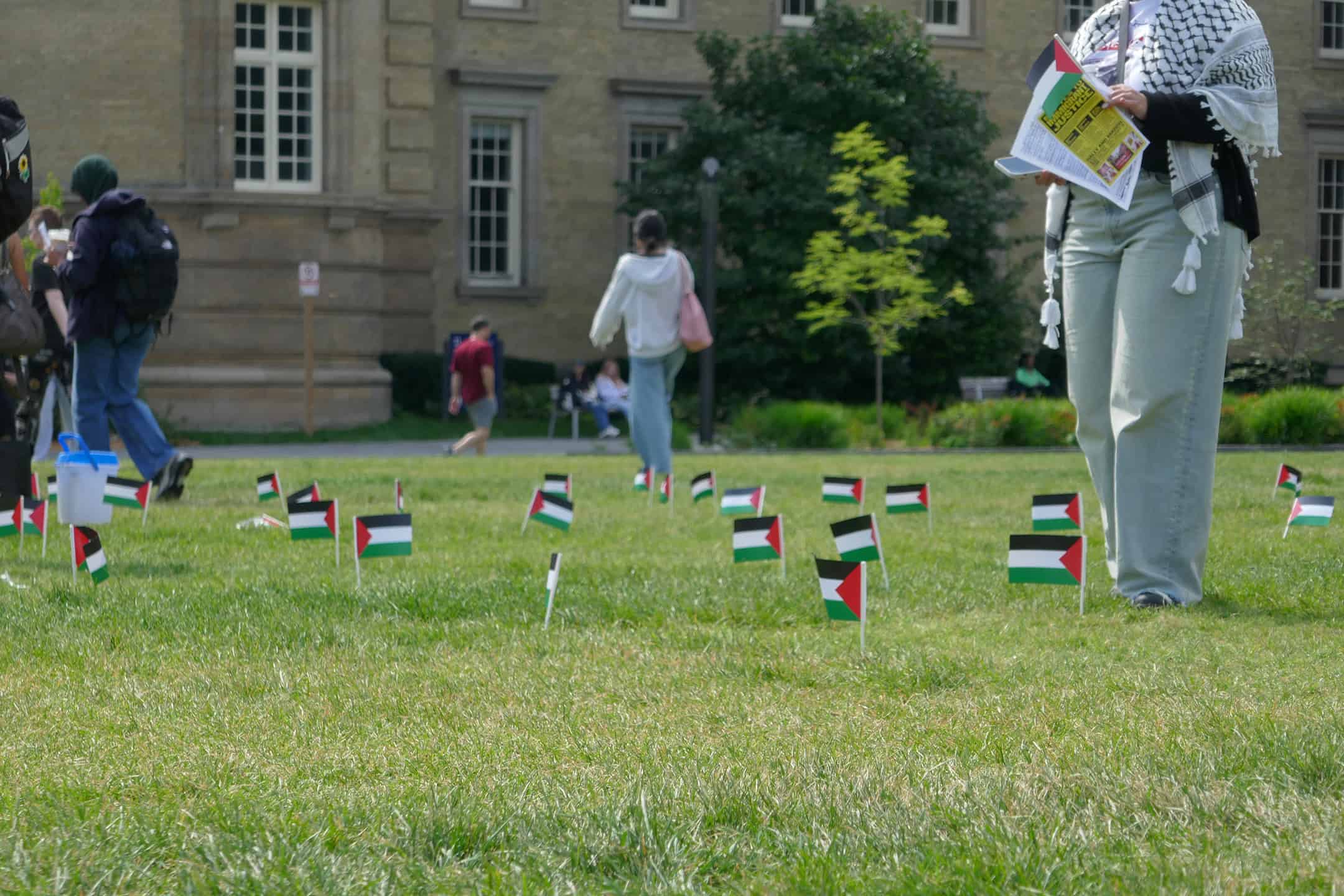
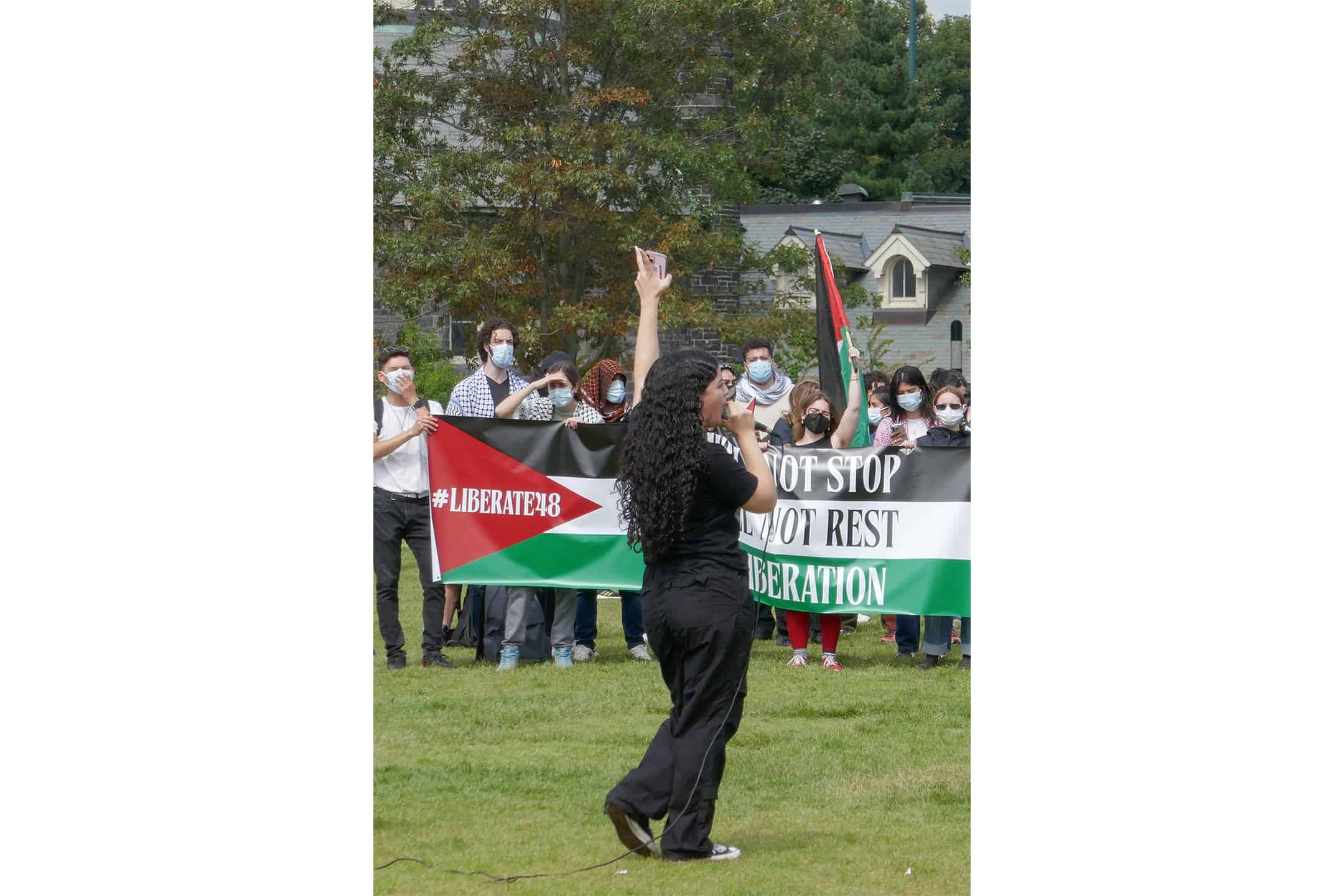
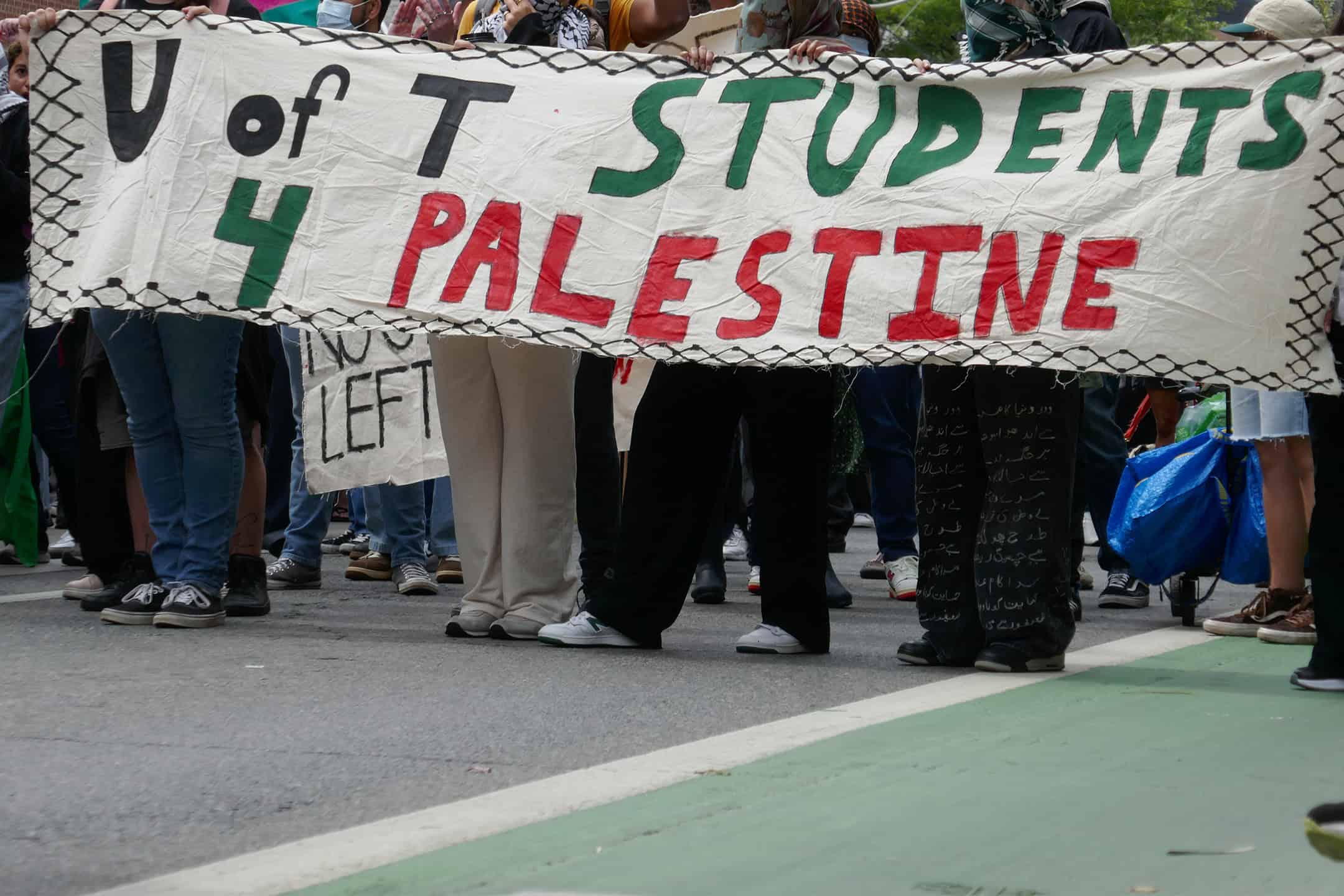
KAISA KASEKAMP/THE VARSITY
U of T policies on protests
In August, the university developed a User Guide to U of T Policies on Protest and Use of Campus Spaces.
“Peaceful protests are a form of free expression and have been a force for progressive change at the University of Toronto (U of T) and elsewhere for generations,” the guide read.
However, it noted that “there are limits,” and that “[v]arious laws and long-standing U of T policies and guidelines place limitations on protest and other forms of expression.”
The guide was informed by the court order for students to end the encampment on July 2, the Code of Student Conduct, and free speech policies, aiming to “assist community members who wish to participate in protests or other similar events… to do so peacefully and without consequence.”
The guide reiterates that the university prohibits occupying or entering U of T premises without authorization, restricts protests from 11:00 pm to 7:00 am, and forbids occupying spaces overnight. The university also allows peaceful protests that don’t interrupt “[u]niversity activities,” including classes and meetings.
Violence, excessive noise that might result from microphones, speakers, or megaphones, blocking access to spaces, intimidation or harassment, certain posters or signs, health and safety risks, discrimination, and exclusivity are not permitted either.
The university also prohibits setting up tents, encampments, fences, barriers, or other structures on campus.
“Engaging in these prohibited activities can result in consequences under law and U of T policies, including arrest, suspension, trespass from property, and expulsion,” according to the university guidelines.
In a statement from various organizations across U of T, the groups condemned the university’s “new restrictions on protests and free expression.” However, a U of T spokesperson noted that the university has not made any changes to its protest and free speech policies for the fall term.
“We, the signatories, are outraged, appalled, and disgusted by U of T’s decision to adopt these regulations and call on the University to rescind this policy immediately and commit to divestment from weapons manufacturers and companies complicit in Israeli apartheid,” read the statement.
“Simply put, our administration permits protests as long as they remain unheard, unseen, and unfelt by the halls of power at our [u]niversity.”
The statement has been signed by 31 student groups and academic workers — including the Scarborough Campus Students’ Union (SCSU), the University of Toronto Mississauga Students’ Union (UTMSU), the U of T Graduate Students’ Union, the Canadian Union of Public Employees (CUPE) 3902, the Pears Project, and Climate Justice UofT.
SCSU Vice-President External Omar Mousa, believes that the university’s rules threaten students’ autonomy and infringe on their rights.
“It completely goes against [the university’s] whole idea and their whole belief… of academic inclusion because nothing is inclusive when you’re silencing people,” he said in an interview with The Varsity.
UTMSU President Joelle Salsa also spoke to The Varsity about the university’s protest policies.
“I think that this is a continuation of [U of T’s] patterns of silencing students,” she said. “Implying fear in students, trying to stop them from speaking up, masking it as [if] they support protest[s] when they don’t.”
UTAM protest
On the same day as the back-to-school rally, O4P organized a student sit-in at the UTAM building.
At 1:50 pm, around 150 protesters headed to the UTAM office on 777 Bay Street. By the time they arrived, Toronto Police Service (TPS) officers had already begun blocking the entrance, while a group of about 20 protesters were inside the building’s lobby.
After chanting outside of the building, protesters moved to the front of the office.
At around 2:15 pm, TPS officers began removing those who were occupying the inside. Multiple protesters were pepper-sprayed by the officers.
Protesters outside the building started chanting, “shame on TPS.” Fifteen minutes later, the protesters continued heading up College Street.
In an interview with The Varsity, Mohammad Yassin, a recent U of T alumnus and O4P spokesperson, condemned the police’s conduct.
“We were here entirely peacefully. We weren’t doing anything, we were protesting peacefully. We were chanting and even the occupation of the [UTAM] lobby was peaceful,” he said.
Yassin claimed that roughly five to six student protesters had been pepper-sprayed by the police and noted that the students used water to wash their eyes.
“The cops essentially came down on us with force while we weren’t using any, and that’s been their tactic to stamp down on protests continuously,” he said.
In an email to The Varsity, TPS Media Relations Officer Cindy Chung wrote that the police were called in after protesters did not leave the building when asked to do so.
“To be clear, this escalation occurred when demonstrators became aggressive after not being permitted to be on private property,” wrote Chung. “Police were blocking demonstrators from entering the rest of the building and were clearly asking them to stay back while also telling them that it was time to leave.”
Chung added that several protesters resisted and were escorted off the property by the police. Chung wrote that “many of the demonstrators continued to resist and became assaultive towards officers and pepper spray was deployed.” One woman was arrested for striking an officer and charged with assault, but The Varsity was unable to confirm whether she was a student.
“We have consistently communicated, [sic] our respect for the right to peaceful assembly and expression. However, this right comes with legal responsibilities,” wrote Chung. “Those who attend demonstrations and engage in criminal activity, including obstructing police, should be aware that such actions can escalate tensions and lead to confrontations with officers, potentially resulting in arrests.”
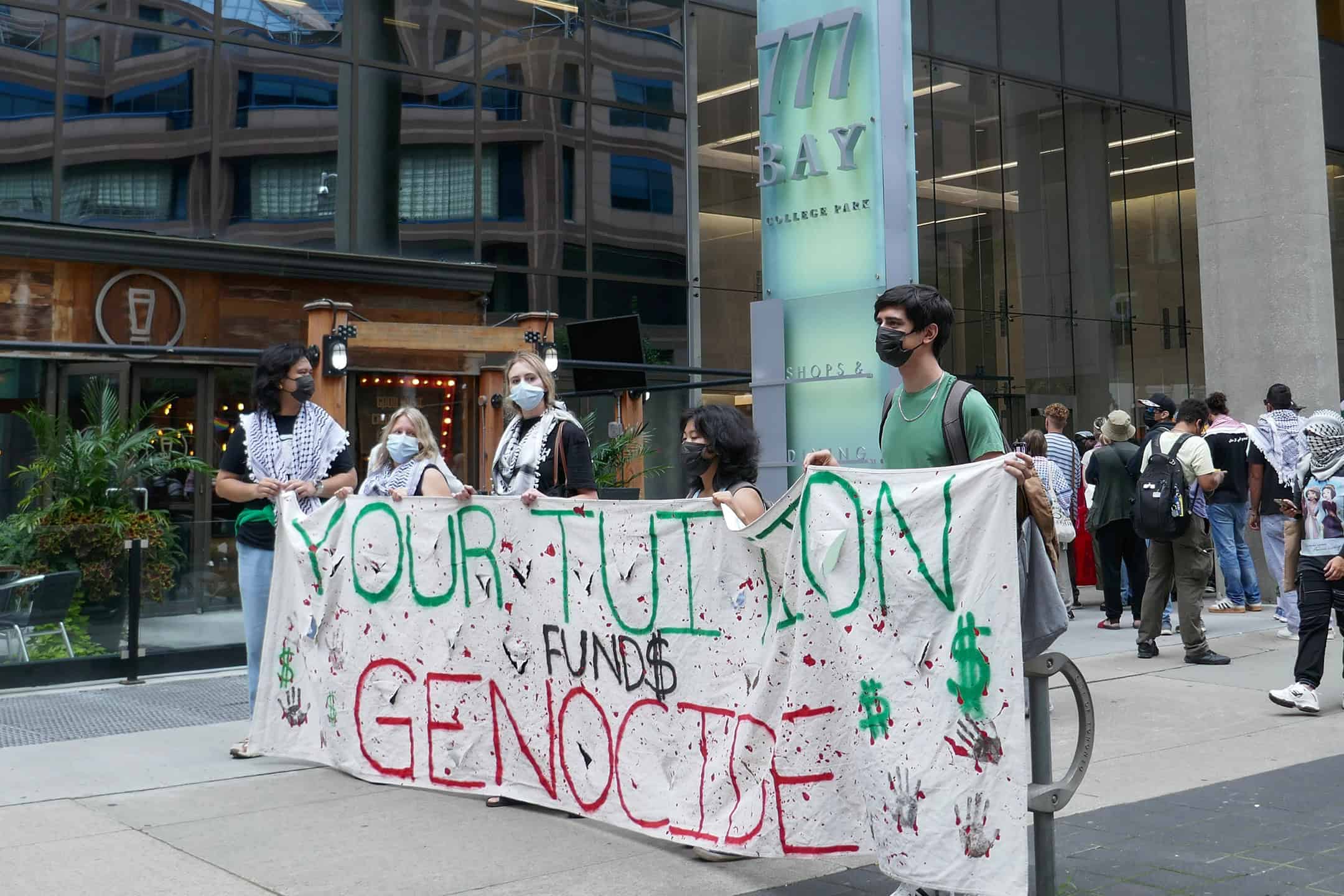
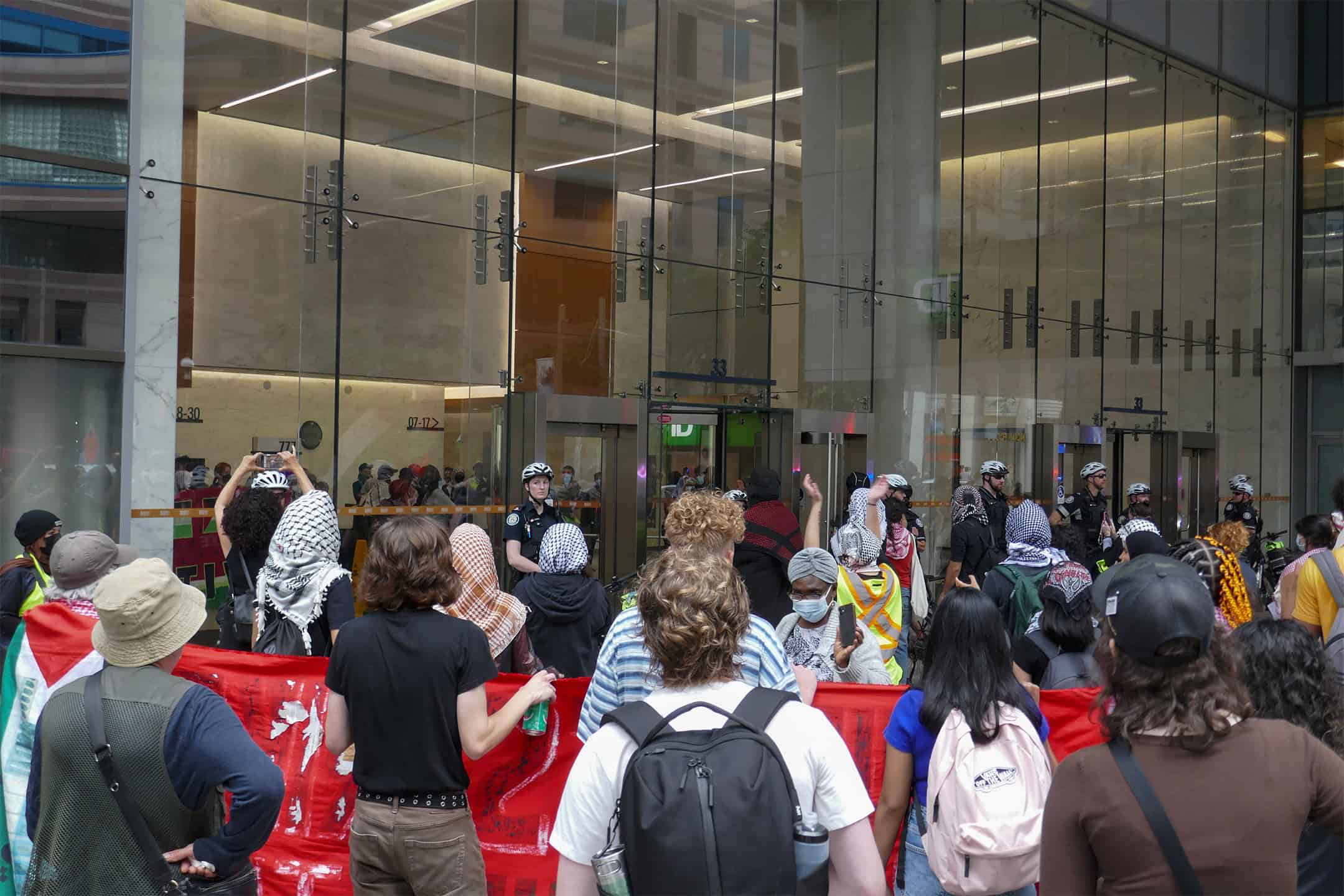
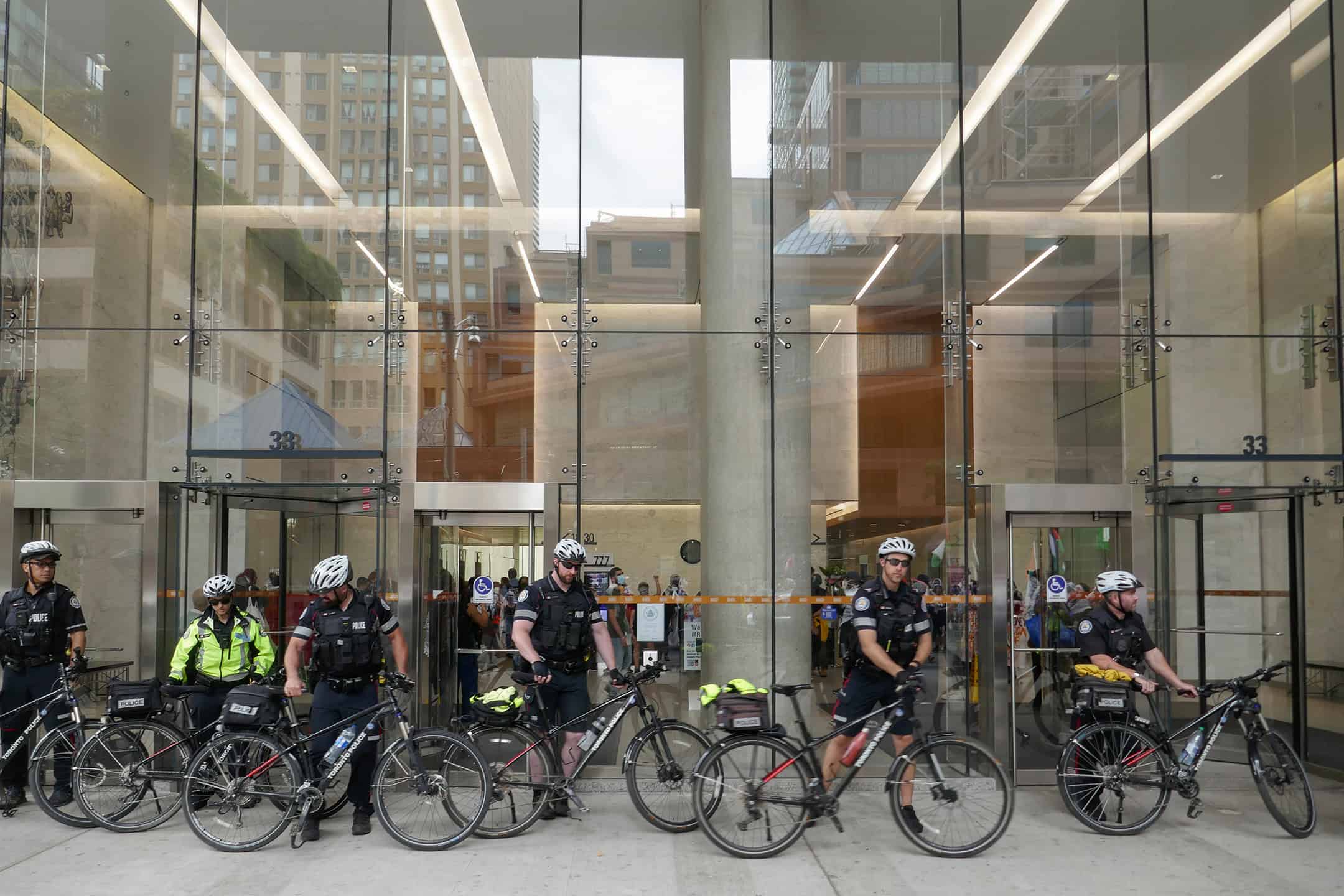
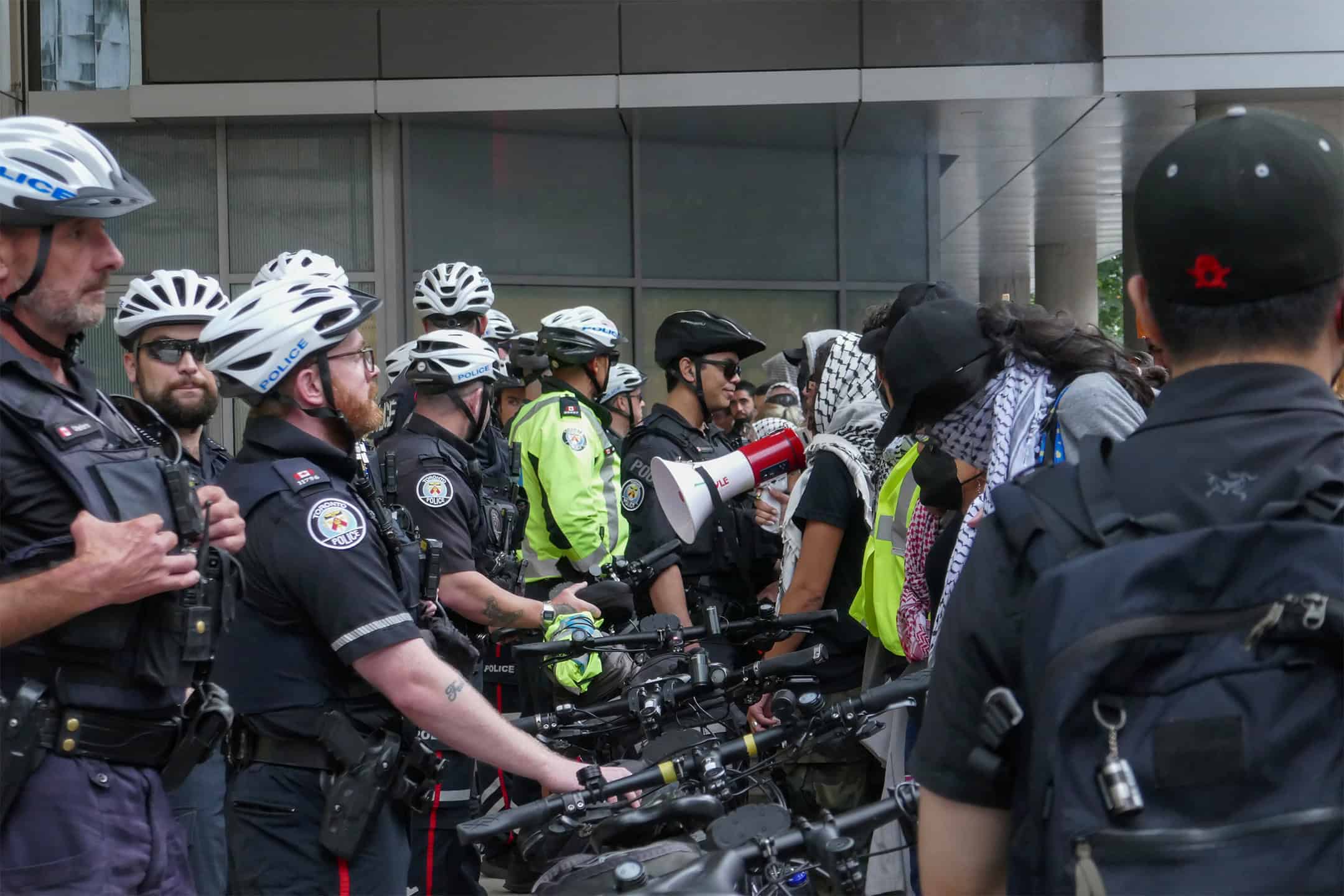
KAISA KASEKAMP/THE VARSITY
After heading up College Street, the protesters turned onto Church Street and made their way to TMU. The protest ended at around 3:30 pm.
Yassin mentioned that the protesters will continue fighting for their cause — regardless of the policies the university chooses to impose.
“I want to see our institution change and I want to be proud of our institution, but I can’t be proud of them when they continue to funnel money into weapons manufacturers the way they do,” he said.

